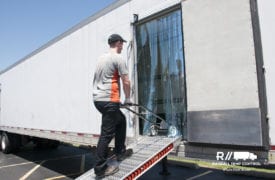
Is Your Fleet Ready for Summer Heat & FSMA Compliance?
As we head into summer weather, temperature control within reefer trailers and FSMA compliance becomes more challenging. With numerous stops, doors opening and closing, warmer air and humidity can infiltrate the trailer; temperature-sensitive food can be at risk.
According to the Centers for Disease Control and Prevention, about 48 million people get sick, 128,000 are hospitalized, and 3,000 die each year from foodborne diseases. With proper food handling and transportation practices, these incidents are largely preventable.
The FDA Food Safety Modernization Act (FSMA) is a wide-reaching set of regulations that shift the U.S. food safety industry’s focus on responding to contamination to preventing it. The FDA Food Safety Modernization Act (FSMA) was signed into law by President Obama on January 4th, 2011. The final rule went into effect on April, 2016.
Compliance will depend on your role in the food supply chain.
These roles are defined as: shippers, carriers, and receivers.
A shipper is a person who arranges for the transportation of food in the United States by a carrier or multiple carriers. The shipper is responsible for communicating appropriate food handling requirements to the carrier. A person may be subject to these requirements in multiple capacities. For instance, the shipper may also be the loader and the carrier.
A carrier is a person who owns, leases, or is otherwise ultimately responsible for the use of a motor or rail vehicle to transport food. The carrier is responsible for ensuring compliance with requirements during transport. Carrier does not include a person transports food while operating a parcel delivery service.
A receiver is any person who receives food after transportation, whether or not that person represents the final point of receipt for the food. A receiver may be a carrier or a shipper but not individual consumers or others who are not in the business of distributing food.
Overall there are five broad elements of FSMA:
Preventive Controls – For the first time, FDA has a legislative mandate to require comprehensive, prevention-based controls across the food supply to prevent or significantly minimize the likelihood of problems occurring.
Inspection and Compliance – The legislation recognizes that inspection is an important means of holding industry accountable for its responsibility to produce safe food. FDA is committed to applying its inspection resources in a risk-based manner and adopting innovative inspection approaches.
Imported Food Safety – FDA has new tools to ensure that imported foods meet U.S. standards and are safe for our consumers. For example, for the first time, importers must verify that their foreign suppliers have adequate preventive controls in place to ensure safety, and FDA will be able to accredit qualified third party auditors to certify that foreign food facilities are complying with U.S. food safety standards.
Response – For the first time, FDA has mandatory recall authority for all food products. FDA expects that it will only need to invoke this authority infrequently since the food industry largely honors our requests for voluntary recalls. The agency has other new authorities that are also in effect: expanded administrative detention of products that are potentially in violation of the law, and suspension of a food facility’s registration.
Enhanced Partnerships – The legislation recognizes the importance of strengthening existing collaboration among all food safety agencies—U.S. federal, state, local, territorial, tribal and foreign–to achieve our public health goals. For example, it directs FDA to improve training of state, local, territorial and tribal food safety officials.
Randall Temperature Control products to assist with FSMA compliance
For refrigerated products, Safe Fleet Truck & Trailer’s temperature control products by Randall Temp Control help create storage division while assisting in the maintenance of defined temperature conditions.
Insulated Bulkheads: create temperature division between your freezer, refrigerated, and ambient zones.

Center Divide Systems: divide the trailer down the center for temperature control with modularity and ability to shorten the load with half bulkheads.

Rear & Side Door Curtains: keep rear and side trailer doors sealed and the trailer interior protected from heat, humidity, and the elements that could compromise temperature control.


Protect your perishable inventory this summer and stay in step with FSMA regulations with Randall Temp Control’s comprehensive line-up of insulated bulkheads, center divide systems, and trailer curtains.
Tap here for the Safe Fleet Truck & Trailer Products Workbook>
Let’s talk about keeping your perishables at temp this summer – 800-323-7424.
Sources:
U.S. Food and Drug Administration. Frequently Asked Questions on FSMA: http://www.fda.gov/Food/GuidanceRegulation/FSMA/ucm247559.htm
Center for Disease Control: https://www.cdc.gov/foodsafety/foodborne-germs.html

